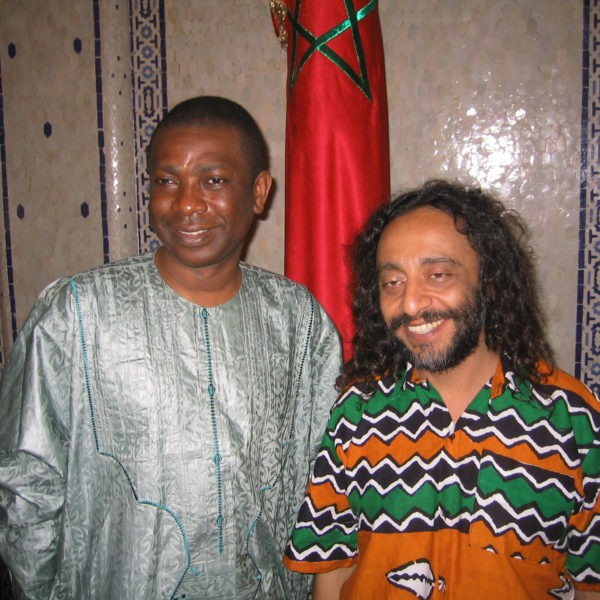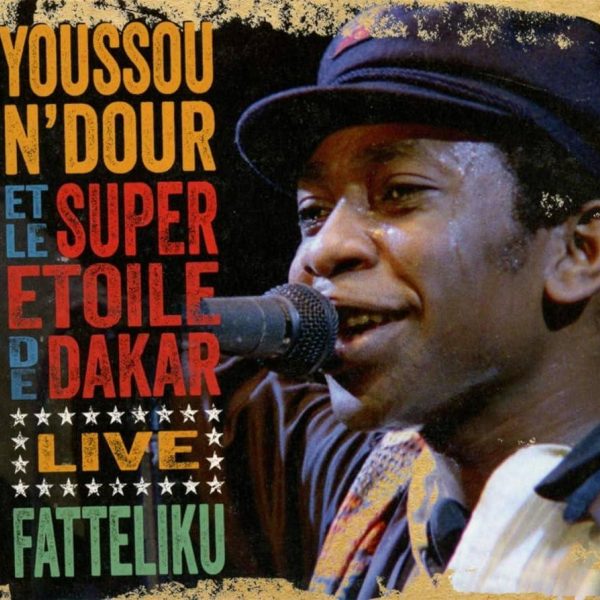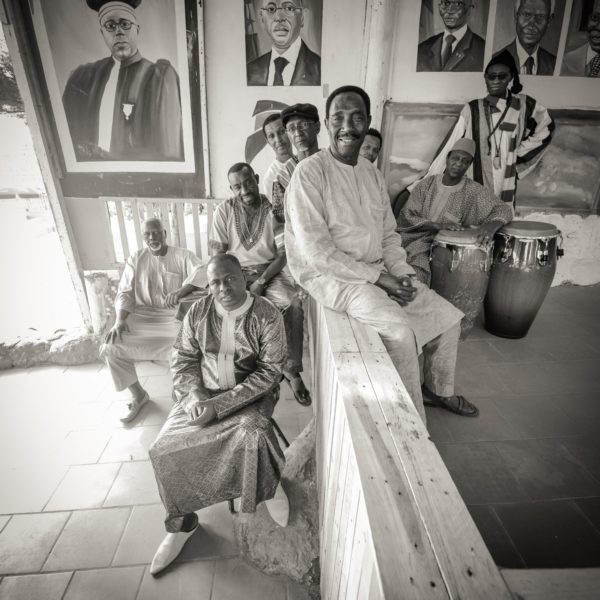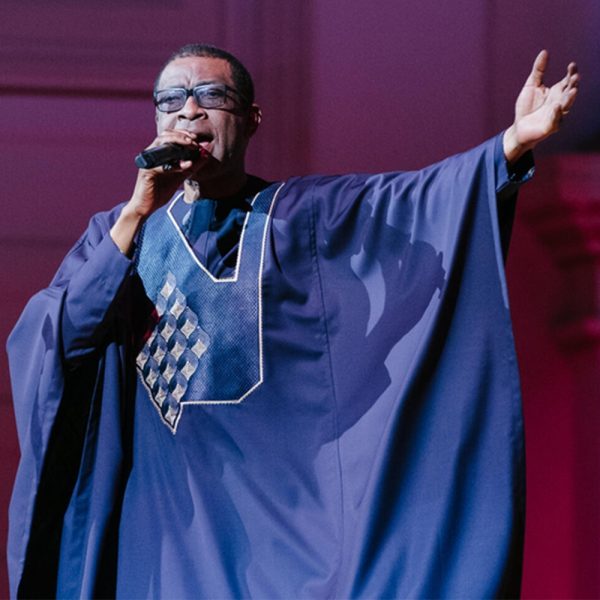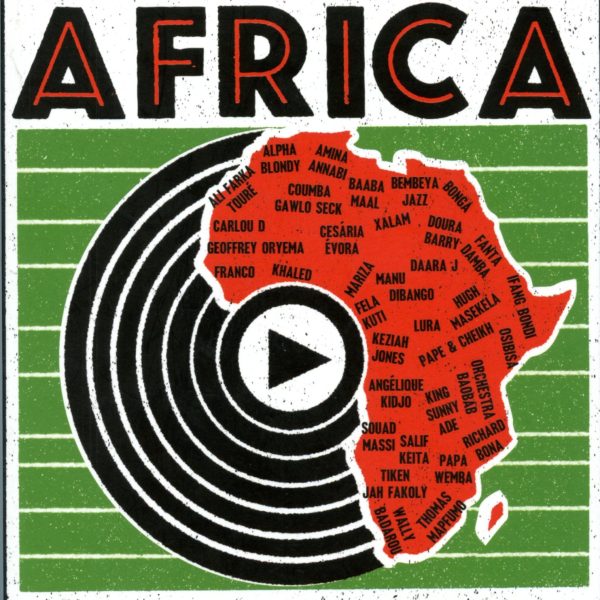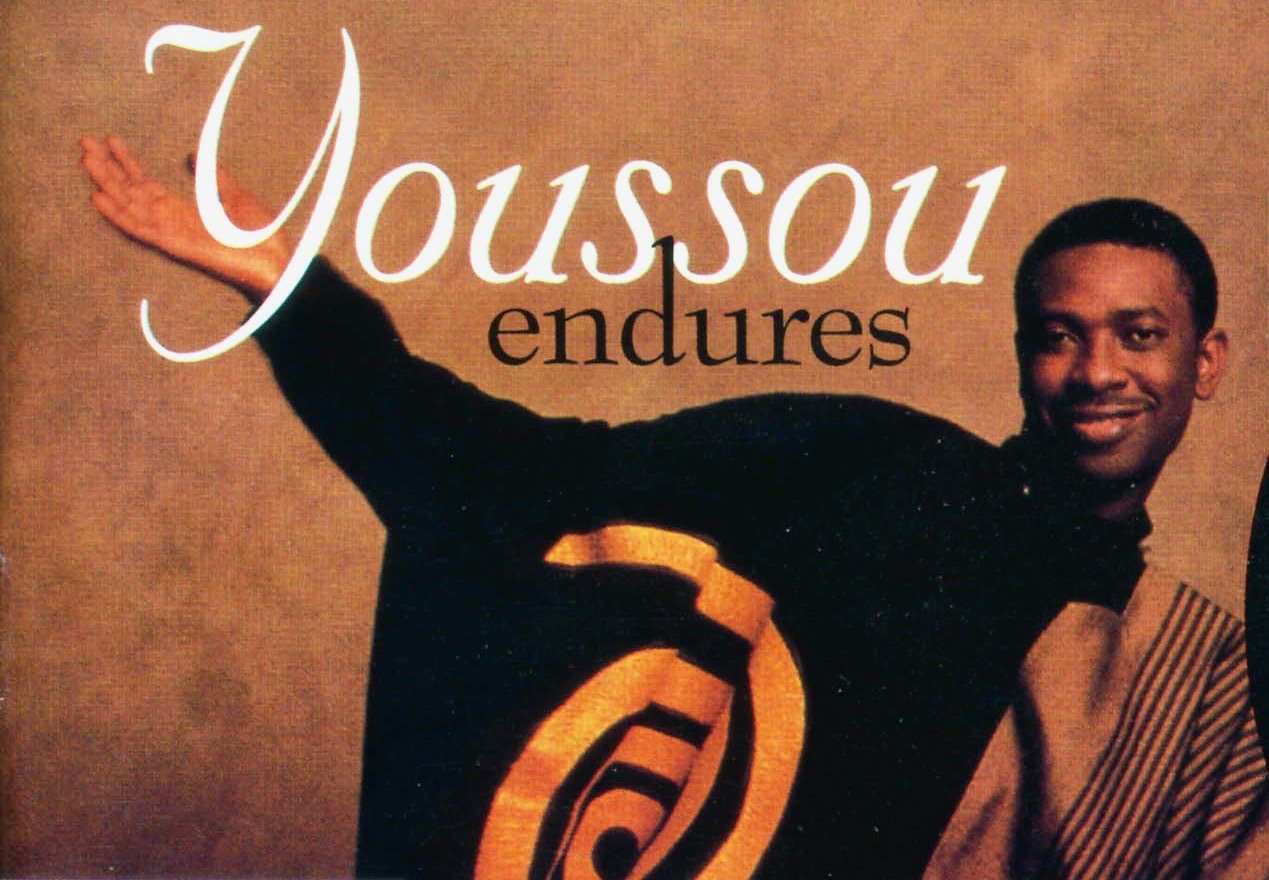Youssou N’Dour is as grand a figure as African music has yet produced. Twenty-five years ago, Folk Roots magazine named him “Artist of the Century,” but this was hardly a valedictory. N’Dour has been going strong ever since, touring the world with his band Le Super Etoile, winning Grammy awards, serving as Senegal’s Minister of Culture, collaborating widely, and releasing album after album of sensational music. He's also been inducted into the Afropop Hall of Fame. Of course! This spring, he releases Light the World (Éclairer le Monde), by one count his 41st album, although with all the local Senegalese releases, live albums, compilations and collaborations, the figure is surely low.
Light the World marks new territory for N’Dour as it was produced by Michael League of the eclectic music collective Snarky Puppy, and djembefola extraordinaire Weedie Braimah. They recorded in a village in Spain, where League now lives, far from N’Dour’s familiar studio setting in Dakar, and from the big urban centers he has frequented in his 50+ year career. The album has a new sound, open and uncluttered, foregrounding N’Dour’s iconic voice as well as taut percussion and traditional African melody instruments.
As the album was about to be released in February, word came that N’Dour’s longtime guitarist and collaborator Jimi Mbaye had died at age 67. In a statement, N’Dour’s team annonced: “Due to the recent death of Youssou N’Dour’s band member, the legendary guitarist Jimi Mbaye, the release of his new album Éclairer le Monde has been postponed. It will now be released on 4 April, allowing time to mourn the devastating loss of his friend of over 40 years. The renowned songwriter, arranger, producer, and singer was an exceptional talent and will be long revered across the music world.”
As the album reaches the world, Afropop’s Banning Eyre spoke with N’Dour in Dakar over Zoom. They discussed the new music, the passings of Mbaye and N’Dour’s one-time protégé, Garifuna musician Aurelio Martinez, as well as the current state of global African music, Here’s their conversation. N’Dour spoke mostly in French, with a translator.
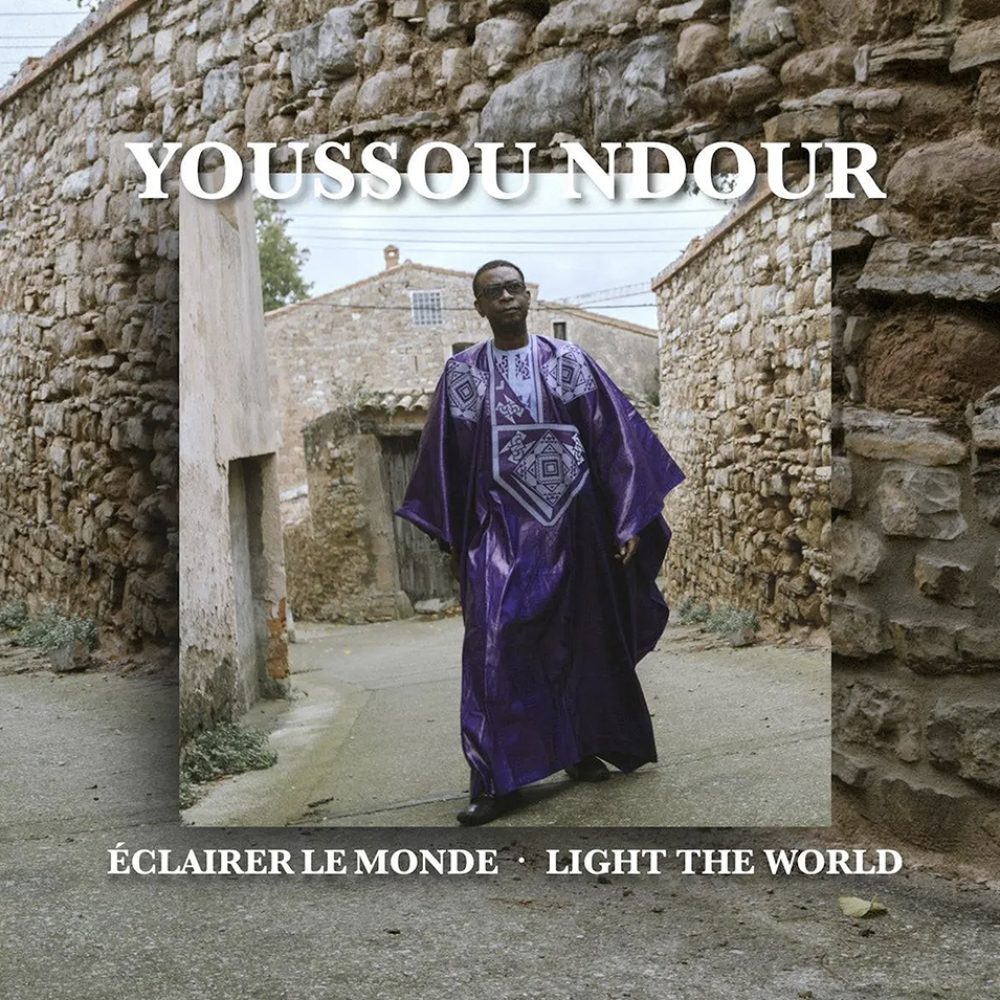
Banning Eyre: Hey, Youssou. Very good to see you again.
Youssou N’Dour: Yeah. It's been a while.
I think we last met at Carnegie Hall in New York in 2022. Well, I’ve been listening to this new album. It's terrific. It has a different soundscape to it. It’s very open and spare. There's less guitar, more traditional instruments, with percussion forward in the mix. And there’s that wonderful vocal chorus you have going through the whole album. You have made so many different albums over the years. What was your thinking on this one?
Thank you very much. So the approach on this new album for me was this. I've noticed that over the past years, world music needed a new breath of fresh air. I needed to have a new inspiration, someone to guide me through the process of doing it. And that's where Michael League came in. The collaboration was just perfect because he brought the new feeling that I needed, and that breath of fresh air that world music needed at this point in time.
You’re talking about your co-producers, Michael League and Weedie Braimah. How did you find and choose these collaborators?
Well, Weedie is the ambassador of percussion in North America, like Mbaye Dieye Faye here in Senegal. I have always liked Michael's productions with his group Snarky Puppy. I think I needed to be with this group to bring something new. I appreciate Michael’s work. It was Michael who asked me to bring Weedie. Michael was responsible for the production. He said, “I want to work with Weedie.” I was very happy because Weedie is someone I really appreciate.
I have known Weedie a long time. We’ve spoken many times. He's a fan of our show.
I know. I know. He told me.
And of course, he was so excited to work with you. He couldn't contain himself. Before we get into the new songs, tell me more about this freshness you wanted to bring to world music. What was it in the sound of this album that is new for you that these guys brought?
I think the percussion on the album is very important. You can feel the percussion in the arrangements. I also wanted show the strength and diversity of traditional instruments from Africa, such as ngoni, kora, balafon, flute. All these instruments are played by great musicians, and for me it was important to have these instruments and to have them be connected with the voice.
I mentioned the vocal chorus that you have that comes in so often. at times it reminds me of Arabic music. It's very soft, very gentle, and it's in almost every song. That strikes me as a new element in your sound.
Well, I worked on the compositions for this album for two years before working with Michael. I started the process with the vocals. Most times at home when everyone is asleep, I do my vocal work, the rough work. And when I realize I’m getting something close to what I need, I go out to the hall where I usually rehearse with the band, and where I can sing louder and express the voice as it should be. So I did that for two years. And then when I finally went to Barcelona and met Michael for the recording, I was able to present the songs, because I had done the work I needed to do behind the scenes. I had traveled through all the forms of interpretation with my voice and how it sounded. So when Michael and I got together, it was easy to produce whatever he needed vocal-wise.
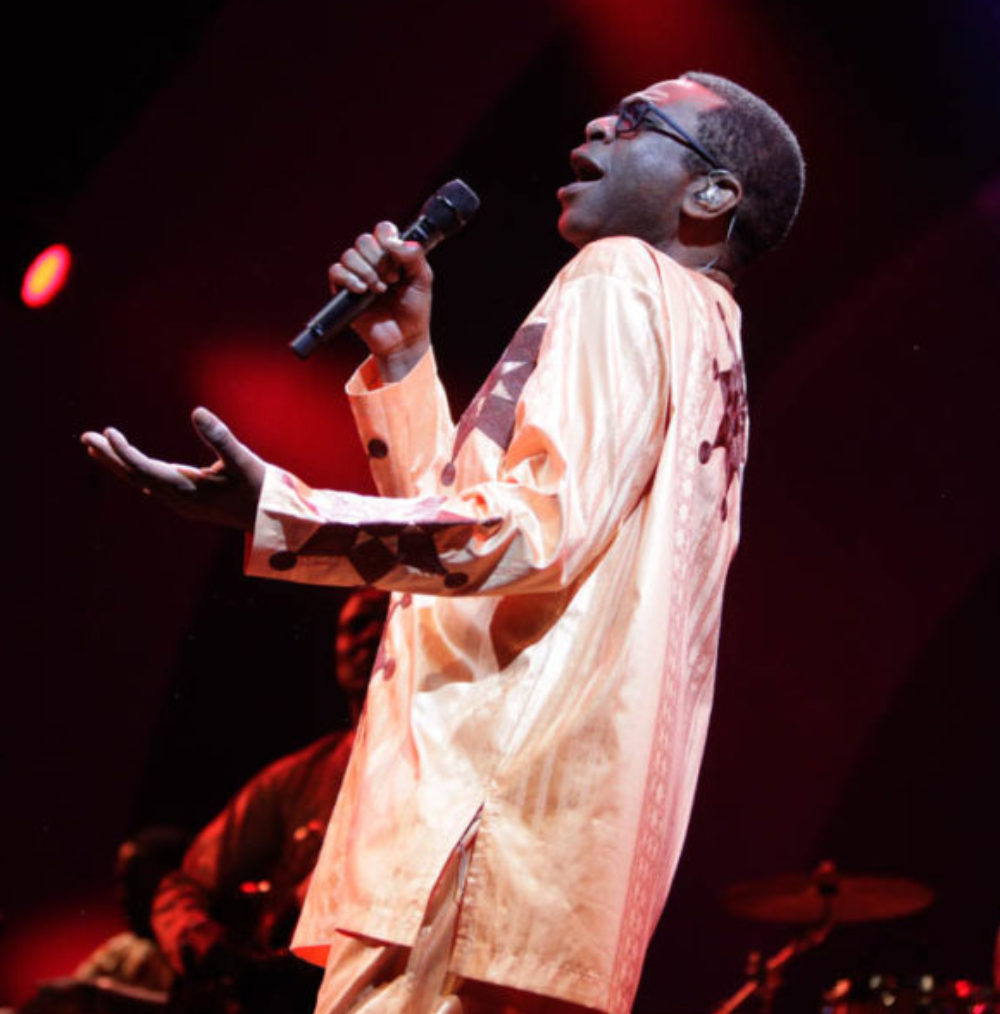
You recorded in Spain. How did that come about? It must have been interesting to record in a new environment, right?
Yes. That was really Michael's idea because he lives there, in a village called Calaf, near Barcelona. His place has extraordinary acoustics, really good. And we had the calm of the village. I really liked that.
Let me ask about a couple of the songs. Let's start with the opening one, “Tout Pour Briller.” Everything shines. This is kind of the theme of the album, isn't it?
Yes. This album was born after Covid-19, which was very difficult and I think the world needed a contribution in recognition of each person. Even if it’s not visible, you have within you a chance to shine. We all have something that shines. I think it's just human. It’s about the confidence that we must have in ourselves during this very difficult time. Everything you need to be who you are, to be the star that you should be, is already in you. So the album is about how we've come through the pandemic and people have gone through a period of desperation and discouragement and distress. And so the title means we need everything and everyone to shine. That is my message to the world.
Beautiful. Let me ask you about the song “Bul Ma Laaj,” which has that strong Fula flute solo in it, a great touch. What is that song saying?
Bul ma laaj is Wolof for “Don’t ask me.” It's a love song. It’s saying I accept that my heart is beating for you. It's my heart speaking. I love you and I'm ready to accept the things you represent, and that you do. So don't ask me. It’s a bit of a joke. You should know my response to certain questions. So there is no need to ask me questions about that because you know where I’m coming from.
I see. How about “Noflaay.” You have a very intense vocal on that song. It feels like it's about something serious.
Yes, it's a noflaay thing. We spoke about everyone having something in them that allows them to shine. Noflaay as a song is kind of linked to that. Noflaay is like an acceptance, accepting a divine orchestration of things. To each and every person, God has given a certain gift, a certain talent, a certain particularity about them. And as soon as you accept a person for who they are and for what they have, you find that Zen spirit. Then there is no jealousy. There is no strife, no division or fighting. You don't have to say, this person is going further than I am going, or this person is doing more than I am achieving. Because you know that things are divinely orchestrated. You also have your time. So it's having that Zen spirit, that tranquility of mind, understanding that each person has a gift given by God, and only God’s timing works.
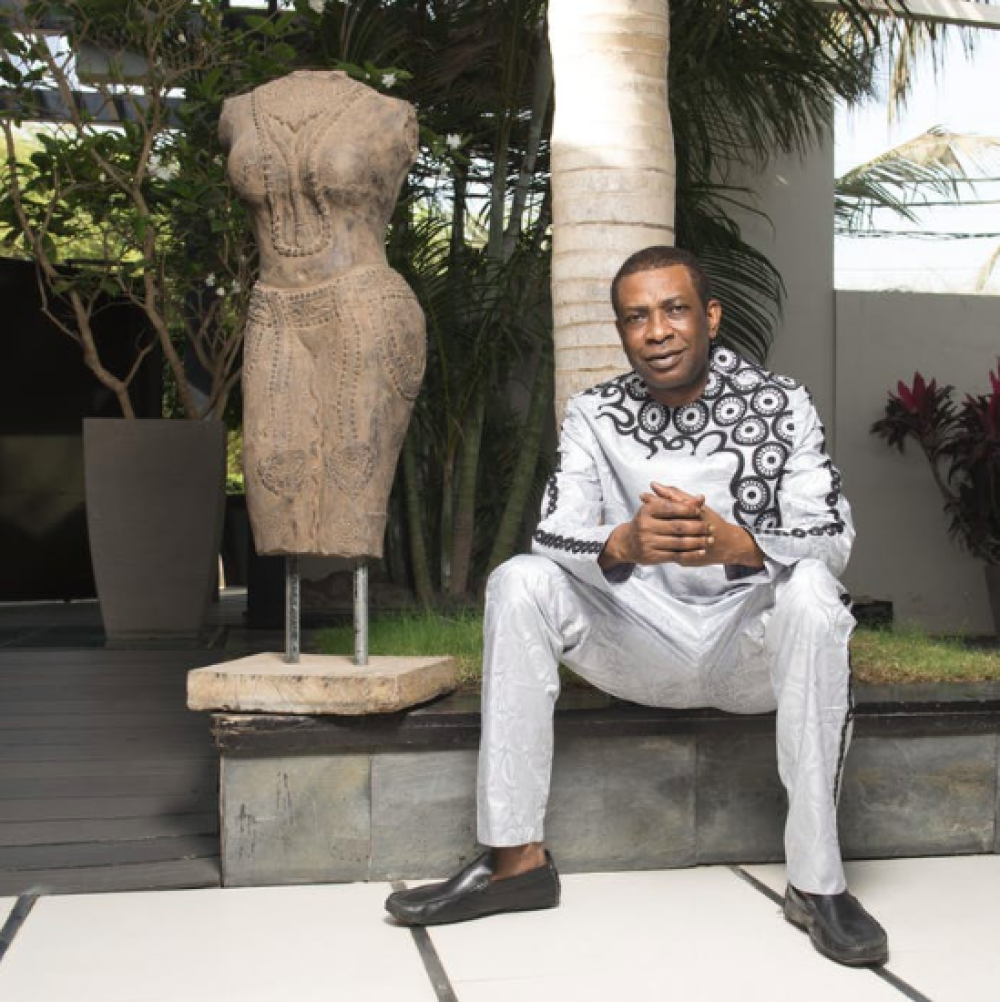
I mentioned that there's less guitar on this album than on some of the others, but you do have this lovely song, “Sam Fal,” which is very spare with acoustic guitar, almost like a ballad.
I am from the Mouride Brotherhood. In Mouridism, there are different sectors. The first disciple of Sheikh Ahmadou Bamba is Sheikh Ibra Fall, the leader of the Baye Fall. A Baye Fall is someone who is very social, very Zen, but who is the door to Mouridism. We could say he was an influencer in the context of the modern life of Mouridism. He was always there to serve Sheikh Ahmadou Bamba in the early days. And his followers managed to maintain a level of solidarity to always be there at the service of others. They have a certain look. They have events and gatherings where they gather to sing in a certain way. They have a particular style of doing things. So I wanted to pay homage to them on this album, with the guitar.
It's a lovely song. Let me ask about “Machalla” another very strong track, and there's some hot guitar playing there too.
Yes, the guitars are there. They are very identifiable. But I think that sometimes we let guitars take the place of traditional instruments like the xalam, the kora, the balafon. So Machalla is the champion, the champion of contemporary life. This album is all about solidarity, selflessness, completely erasing egoism. Machalla is someone who succeeds, who looks at others and is always at the disposal of the community. After the pandemic, I think we needed more solidarity, to listen to others more and to take care of others.
We know that, especially in the Western world, there is a lot of selfishness. We tend not to look at these machalla people, because most times they're not the most famous or the most known people in the society or in a community. But they're the people who are always there, always listening with open arms to receive whoever is there and being of assistance in whatever way they can. This song was my way of honoring that person's spirit. “Hey, you are here for everyone. And may you also receive the strength that you need.” Because in the Western world, people tend to be closed within themselves. So Mashalla is about that person who is there to say, “Hey, don't hide within yourself. Don't seclude yourself. Come out. Listen.” We all need one another to be able to share our problems with. And personally, I am always trying to be that person among my people.
I think you do that very well.
Well, I'm not yet that person, but I'm trying to be that person.
How about in “Mbëggėel doole”?
“Mbëggėel doole” is also about love. But it’s also a tribute to this legendary group called Orchestra Baobab. I am thinking of all these great musicians who I had the opportunity to collaborate with and to see their style and everything. You hear in the groove of Baobab something very Latino, but really the style is Baobab. So this is a tribute to that style that has pierced us and marked our people with their fantastic performances and collaborations. If you listen to the track itself, you can hear that the sound of the song kind of resembles how they used to play. So this was my way of rendering homage to Orchestra Baobab for all the great work they did. Unfortunately, so many of them are not with us anymore. So this song is in that spirit of Orchestra Baobab.
That's wonderful. I love the production on that song because it's a rather slow song, but it has inside it these much faster rhythms that are inserted. That's interesting. I understand that Baobab is continuing with a new team of younger musicains. And I gather that people are really loving it. That's exciting. I love it when a band is able to continue beyond its creators, and reach a new generation. That shows what a powerful band it was and is.
Yeah!
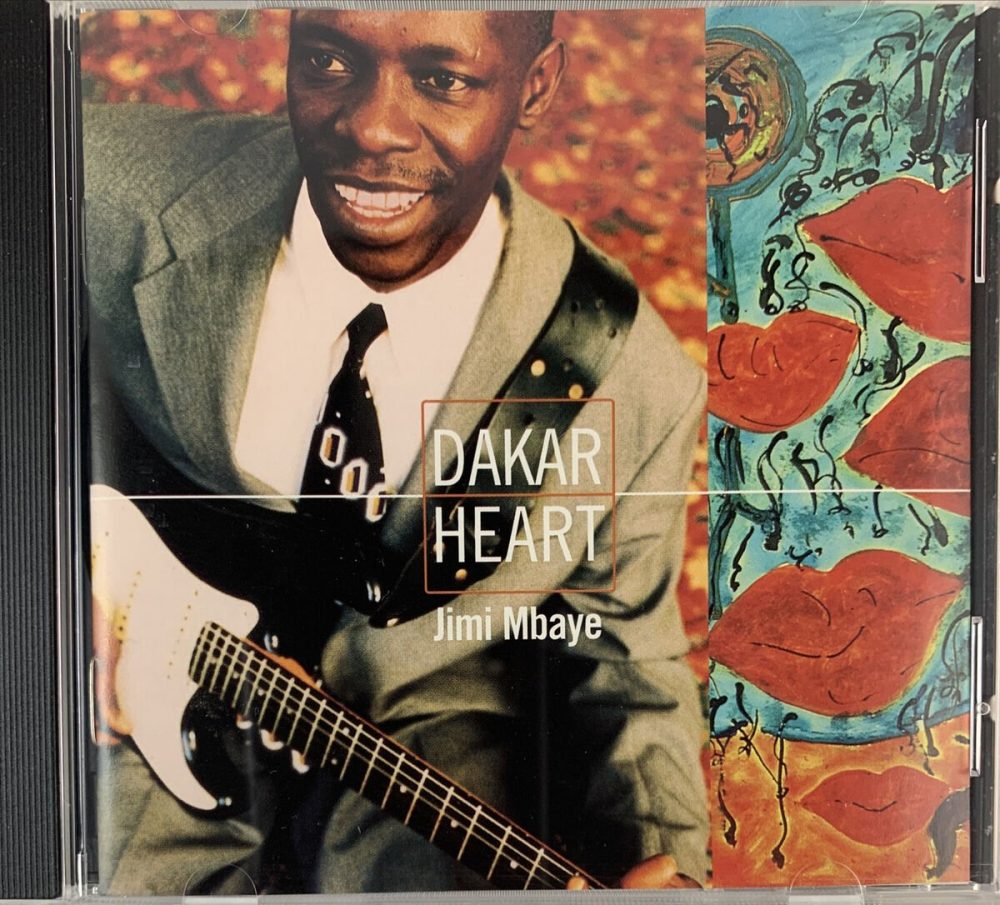
On the song “Say Thank You,” I hear a kind of adaptation of mbalax. I hear mbalax in there, but other things too. And I hear the guitar sound of Jimi Mbaye, whom we lost just recently. Is that him, or is that an homage to his style? And tell me, what are we saying thank you for here?
“Say Thank You” is an homage to my mother, to all mothers. Musically, the guitar player is Moustapha Gaye. In the studio, Jimi was not there, though he had not yet died. I said, “In this song, I want to hear Jimi Mbaye and Pape Oumar Ngom (also a Super Etoile guitarist). And when you hear the song, you hear the sounds of Jimi Mbaye and Pape Oumar Ngom. It's a beautiful production. I really love this song.
And you end with a new song for Amadou Bamba. There have been others in the past, right?
True. It's like a ritual. I sing Bamba all the time, even in my head, because he is my guide. So I come again to talk about his good deeds and how he guides us, how he guides me. And so, every time I write, I can't help but think of Amadou Bamba. It's like people who always make albums about love. For me, the love I have for Bamba is always there. And so I have a lot of versions of Bamba.
Well, it’s a very good way to end this album. So we mentioned that we lost Jimi just a couple of months ago. I would love to hear any thoughts you have about that. But I also have to ask about someone else we just lost, which is Aurelio Martinez, who you mentored back in 2009 as part of the Rolex Mentorship program.
Yeah.
Sean and I attended a memorial for Aurelio in Bronx, where he spent a lot of time. It was just days after he died and there were hundreds of people there, packed into this hall and singing his songs and playing his music all night long.
It’s so hard, man. I remember when he was in Dakar and we had something on TV. He was just lovely. People didn't know what he was singing, but people loved him because of his melody, his energy and everything. It’s a big loss. Like Jimi, also a big loss.
Well, I guess we just have to honor the people we lose. It's especially hard with Aurelio because his predecessor, Andy Palacio, also died very young and very suddenly. The Garifuna community is really feeling it.
Yeah, yeah, definitely.
I just wanted to hear a word about Aurelio, because I know his mentorship with you was huge for him. He often spoke about it. Such a great artist. Anyway, we go on.
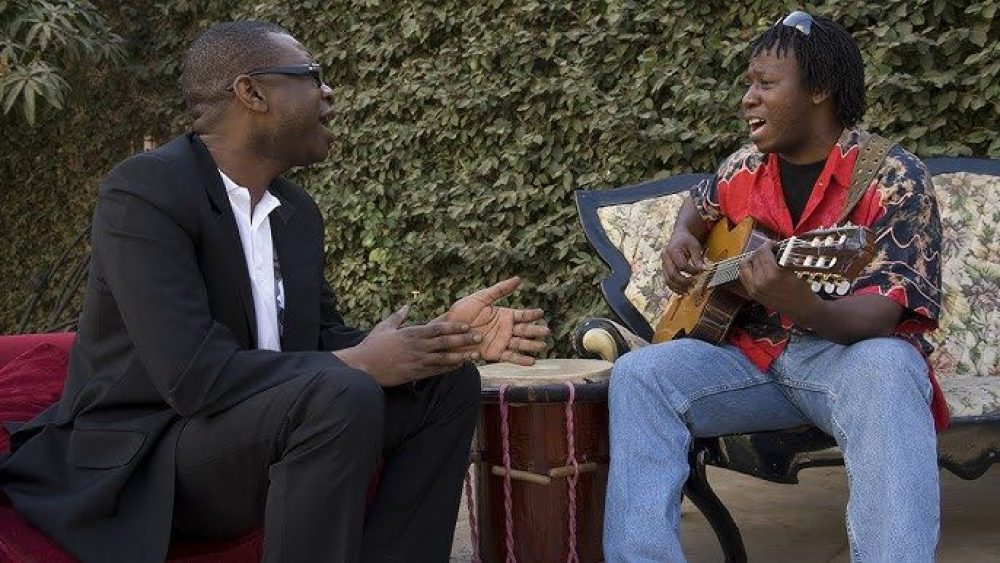
Before we end, let me ask you a bigger question about where music is in 2025. We at Afropop were very impressed to see you opening the Madison Square Garden show with Burna Boy a couple of years ago. That meant a lot to us because we're feeling at Afropop this sort of disconnect between the generations. You are talking about bringing freshness to world music. Meanwhile, most of the world is focusing on this new generation of artists with very different musical styles, whether Afrobeats, Amapiano, all these new sounds younger artists are pioneering.
We are always trying to figure out a way to connect these audiences, because it can feel like they're quite separate. How do you look at the way that African music is in the world now? You could say it has two faces. There's the generation that Afropop has championed all these years and then there's this new wave of artists with a far more international sound.
Yes. I think part of the question has to be asked of the West. What do people want? Really, in the West, people prefer traditional African music, which has nothing to do with cities, with the urban side. They may not be many, but they have the power to say that this is valid, and that is not valid. But in Africa, at the demographic level, there is something extraordinary happening in our cities. This African music that comes from cities has a lot of potential to become popular all over the world. And that's what's happening. Our artists who are born in African cities know a lot of modern things. They are creating their own music, and this music works very, very, very well. But you and me and others prefer music that comes from villages, that comes from tradition.
It's like in the United States or Australia, there is traditional music and modern music. The West has always thought that the traditional sound should represent Africa. But young people say, “No. We have traditional music like you, but we also have modern music.” That’s what is happening. There are some who return to their roots, like Burna. He is a very talented but he respects traditions. Artists like that can look back and see that the power, the source of African music, can also be embodied in the modern. That's the idea of this album I am releasing, to encourage our young people always to see the source.
Interesting. Well, I think we're on the same page trying to bring these worlds together. You know, I always feel like one of the reasons that Afropop is still here after 37 years is just that. If you look at blues or rock or any of the sort of jazz, even hip-hop, there are books, movies, institutions, there are radio shows, television shows, documentaries, all preserving the history, honoring the roots, telling the story. But we feel a little bit alone when it comes to the history of African music, because those stories aren't really being told in the same way.
That’s one reason we so appreciate your support and advocacy for us all these years. We still honor you as board member. In some way, we've been on the same mission in our different ways over these years. And by the way, I send greetings from Georges Collinet, who I was just speaking with this morning.
Yeah! Yeah!
And Sean Barlow. Unfortunately, I'm going to be in California when you come to King’s Theater in Brooklyn on April 27, but Sean will be there.
That's good. That's good. Definitely. Thank you so much.
Well, thank you and good luck with the album and the tour. It's a pleasure to speak with you again.
Thank you. Bye bye.
Related Audio Programs
